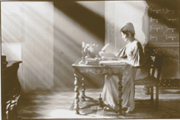Horsing Around
A French epic aims for old-fashioned Hollywood gloss
By Richard von Busack
AFTER HEARING that a movie is based on a classic novel, it's refreshing to pick up the book in question and have it turn out to be pretty good. Jean Giono's Le hussar sur le toit--translated in 1953 as The Hussar on the Roof--is in many ways an old-fashioned book, just as it's been adapted into an old-fashioned movie, The Horseman on the Roof. In an era of modernism, Giono wrote a Flaubert-like lapidary prose. He describes, for instance, a heat wave with such harrowing detail that the very pages seem to smoke. The plague that follows is observed with detachment as he covers all corners of cholera-stricken Provence in summer 1832 like a reporter: the blue-faced choleric dead look to the hero like grotesque clowns, the Marseille harbor boiling under a merciless sun is water "rotting like an organic body."
Returning to the book is not just a way to disparage the film but also an attempt to figure out why the movie, for all its fine surfaces, isn't more involving. The Horseman on the Roof, composed to the point of featurelessness, preserves Giono's plotting but not his language. Angelo, who in the novel says you can never display enough mettle, is debunked a bit; that grim thought about the clown faces of the dead would never have occurred to Olivier Martinez's Angelo, who is something of a heroic, virginal simp, especially by comparison to the resourceful heroine, Pauline de Theus (Juliette Binoche). Angelo, a colonel of the Piedmontese hussars, is roaming the south of France after having been driven from his Italian home by Austrian agents. In his wanderings, he's caught behind the lines of quarantine for a massive cholera epidemic and chased into a rooftop by a lynch mob ready to kill strangers who might bear the disease. After a bad night, he takes shelter in the townhouse where de Theus is stranded, wanting to get back to her estate. They split up, but after some adventures in the countryside, Angelo re-
The film is visually diverting, set in the fairest countryside on earth with, of course, the exception of Northern California. Martinez is the Tom Cruise type, if you like them like that. Directed by Jean-Paul Rappeneau, who directed the equally superficial Cyrano, this French film tries to beat the American movie at its own speed and slickness. Binoche's subtlety is the best thing (with perhaps the exception of gorgeous day-for-night photography in the mountains) in the movie, and her ironical smile gives an idea of what it must have been like, back in great-great-grandfather's day, to be seduced by a glance. Unfortunately, where Giono's book takes you into the complex mind of a cavalier in an era during which aristocracy was ebbing away, the film just gives you the exteriors, costumes and scenery, making it only moderately interesting as an action picture and fairly unstimulating as a love story.
[ Metro | Metroactive Central | Archives ] This page was designed and created by the Boulevards team.

Corner Office: Juliette Binoche soaks up the sunlight in Jean-Paul Rappeneau's new costume drama, "The Horseman on the Roof."
encounters de Theus and decides to ride with her through the barricades set up by the army to keep the plague from spreading.
The Horseman on the Roof (R; 118 min.), directed by Jean-Paul Rappeneau, written by Nina Companeez, Jean-Claude Carriere and Rappeneau based on the novel by Jean Giono, photographed by Thierry Arbogast and starring Juliette Binoche and Olivier Martinez.
From the May 23-29, 1996 issue of Metro
Copyright © 1996 Metro Publishing and Virtual Valley, Inc.
